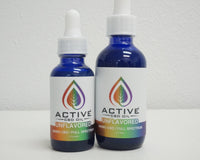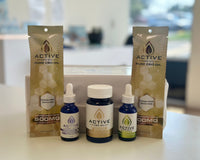When buying or researching CBD there is often so much information and misinformation out there that it can be overwhelming to discern what is accurate. One of the first things someone should know when purchasing CBD for the first time is the difference between full spectrum, broad spectrum and CBD isolate products, which can shed some light on the reasoning behind certain myths within the industry.

Simply put, full spectrum extracts are a whole hemp plant extract. Nothing has been removed from these extracts, which makes them the least processed of any hemp extract you’ll find. Full spectrum extracts contain THC, minor cannabinoids and terpenes and flavonoids. If your full spectrum products are derived from industrial hemp, you won’t find any more than 0.3% THC by dry weight in them. This is due to the fact that in order for the plant to be classified as industrial hemp, it can not contain more THC than that limit. What this means as a consumer is that there shouldn’t be enough THC for it to be intoxicating. That being said, there absolutely is enough THC to potentially fail a drug test when taking full spectrum products. This is something to be careful about, as some companies claim their full spectrum products are THC free. It’s always vital to check any lab results when buying CBD anyway, but especially if you’re someone who frequently or randomly gets drug tested. Most people in these circumstances prefer to say better safe than sorry and avoid full spectrum products altogether. Full spectrum products tend to have a more linear dosing pattern where an individual may continue to increase their dose and still see more potential benefits meaning that these products tend to have the widest range of effective doses. This often makes full spectrum a more popular choice among people who can have THC.

Second to full spectrum extracts in purity as well as efficacy is broad spectrum extracts. Broad spectrum extracts are still whole hemp plant extracts, they’ve just been filtered to remove the THC. The filtration method is called chromatography, and it leaves minor cannabinoids as well as terpenes and flavonoids untouched. This filtration makes broad spectrum extracts more processed than full spectrum extracts. As for the range of effective doses, there is a smaller range for broad spectrum than full spectrum. That being said, it can be a nice middle ground between full spectrum and CBD isolate. While it is THC free, it still has a wider range of effective doses than CBD isolate. Unfortunately, broad spectrum extracts are used the least in research compared to full spectrum extracts and CBD isolate.

A huge distinction between these whole hemp plant extracts and CBD isolate is the entourage effect. This is actually where the myth that CBD products need to have THC stems from. A hemp plant contains so much more than just CBD and THC. In fact, hemp is known to contain around 118 minor cannabinoids as well as a myriad of different terpenes and flavonoids -- which can vary depending on the specific plant. Whole hemp plant extracts such as full spectrum and broad spectrum extracts contain these minor cannabinoids such as CBG and CBN as well as terpenes and flavonoids. All of these components are suggested to work synergistically together to create a greater effect overall -- which is what we call the entourage effect. While there is some research that suggests that THC, even in trace amounts, can amplify this effect -- it isn’t necessary.

While the entourage effect can bring added benefits, there is still a place for CBD isolate products which will be the most pure form of CBD products that can be as high as 99% in purity. One of the positives of CBD isolate is that in general it is a fair amount less expensive than broad spectrum and full spectrum extracts on average. This makes it a more accessible option for those living in lower income households. We often see people using the CBD isolate powder to make their own products making it incredibly versatile with how it can be used. Another benefit is that CBD isolate itself is flavorless since it does not have any terpenes and flavonoids -- which generally taste bitter -- unlike whole hemp plant extracts that do have the terpenes and flavonoids. That being said, CBD isolate generally has a much narrower margin of potential effects, as well as a reduced peak effectiveness. CBD isolate products tend to have a dosing pattern that works on a bell curve, where taking too high of a dose past our optimal dose may have diminishing results. However, being THC free this can be a safer option for pets and those looking to avoid failing a drug test.

There is so much to learn about CBD, and unfortunately so much misinformation out there. It’s important to know about the different kinds of CBD products and hemp extracts to avoid things like losing your job -- or even just to make sure you get a product that is most practical for your life and lifestyle. Here at Discover CBD we believe that an educated consumer can better make the right decision for what product might be better suited for their own needs. Understanding the core differences between these three categories of Full Spectrum, Broad Spectrum and CBD isolate is a great first step to move into other important questions such as how much CBD to use and what method of consumption to consider.Our team is highly knowledgeable and we are always willing to help answer any questions you might have to help you navigate through this new realm of CBD. Feel free to give us a call or chat right here on our website anytime.


























